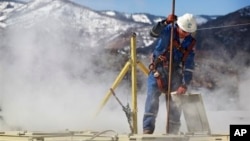The International Energy Agency (IEA) says the rapid growth of oil production in North America is significantly reshaping the global market.
The Paris-based IEA said Tuesday in its annual Medium-Term Oil Market Report that increased production in the northern U.S. state of North Dakota and in the oil sands of Canada "will be as transformative" to the world oil market over the next five years as increased oil demand in China has been over the last 15 years.
IEA executive director Maria van der Hoeven said the North American advance "has set off a supply shock that is sending ripples throughout the world."
The agency said that during the next five years, North America will account for nearly two-thirds of the growth in the world's oil supply among countries outside the Mideast-based Organization of the Petroleum Exporting Countries (OPEC). OPEC currently accounts for about 35 percent of the world's oil production.
New oil production technologies have played a key role in the North American advance — chiefly hydraulic fracturing, commonly referred to as fracking, the process by which torrents of water and other materials into rock formations to loosen oil deposits for drilling.
The change has been so dramatic that the United States could surpass Saudi Arabia as the world's largest oil producer by 2020.
The IEA said that although shale oil development may not advance much outside of North America in the next few years, the new technologies could lead oil companies to consider exploration in higher-risk areas they previously had rejected as too costly. Van der Hoeven said that could lead to an upward reassessment of the world's oil reserves.
Some information for this report was provided by AP and AFP.
The Paris-based IEA said Tuesday in its annual Medium-Term Oil Market Report that increased production in the northern U.S. state of North Dakota and in the oil sands of Canada "will be as transformative" to the world oil market over the next five years as increased oil demand in China has been over the last 15 years.
IEA executive director Maria van der Hoeven said the North American advance "has set off a supply shock that is sending ripples throughout the world."
The agency said that during the next five years, North America will account for nearly two-thirds of the growth in the world's oil supply among countries outside the Mideast-based Organization of the Petroleum Exporting Countries (OPEC). OPEC currently accounts for about 35 percent of the world's oil production.
New oil production technologies have played a key role in the North American advance — chiefly hydraulic fracturing, commonly referred to as fracking, the process by which torrents of water and other materials into rock formations to loosen oil deposits for drilling.
The change has been so dramatic that the United States could surpass Saudi Arabia as the world's largest oil producer by 2020.
The IEA said that although shale oil development may not advance much outside of North America in the next few years, the new technologies could lead oil companies to consider exploration in higher-risk areas they previously had rejected as too costly. Van der Hoeven said that could lead to an upward reassessment of the world's oil reserves.
Some information for this report was provided by AP and AFP.
